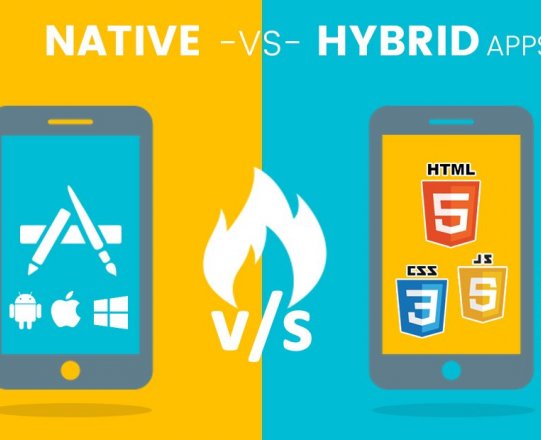
We are living in a digital world and smartphones are ruling our lives. Right from morning alarm, to daily news, lunch, fitness, games, business meetings, social media, music, shopping and what not - our lives don’t move an inch without mobile apps. These apps have turned out to be a big problem solver during the COVID crisis - helping small and big businesses, schools/colleges and other organizations conduct their day to day operations smoothly. Thus, the demand for mobile apps is rising by leaps and bounds.
If you have come up with a brilliant mobile app development idea and ready to approach the best iOS or android app development company, then take a pause. You must first decide whether you need a native app or a hybrid app for your business.
Read on to know what these apps are meant for and their pros and cons.
Native apps are applications coded in a platform-specific programming language using dedicated software development kits. It means if an app is meant for an Android platform, it will use Java language; if it is for a Windows phone, it will use C# and so on. These apps are specially designed for a particular device.
Talk about any reputed android app development company, they mostly prefer native app development. Most of the apps on our mobile devices are native apps. There is always a high demand for native app development because they are fast, powerful, reliable and highly responsive.
Pros
1. Faster in execution
2. Full-fledged functionality
3. Native apps have recognizable look and feel
4. Smooth performance and rich user experience
5. Native apps maintain aspect ratio, an important factor that determines the quality of an image.
6. Native apps work even if there is no internet connectivity.
7. Secured and reliable data protection
1. Built for a single platform and need different coding to run on other platforms
2. Developers have no flexibility with respect to the platform for app development
3. Time-consuming
4. Expensive development because native apps are resource-intensive
5. Native apps have a lengthy downloading process
6. Require frequent updates
These are applications developed for multiple platforms such as Android or iOS using a single code base. Unlike native apps, hybrid apps are made of cross-platform technologies (like JavaScript, CSS, and HTML that are combined together), so they can run in multiple environments and across a range of mobile devices.
Pros
1. Low development cost
2. Great market reach because hybrid apps run on multiple platforms
3. Fast development
4. Easy to update and modify
5. Support for Cloud & Enterprise-Level Solutions
1. Slow performance and limited capabilities
2. Long waiting time to support new features
3. Issues occur if the mobile app has complex features and functionalities
4. Poor user experience.
5. Hybrid apps are websites at their core and require a constant internet connection
6. Prone to being buggy.
7. Hybrid apps offer less in terms of security
As you can see both native and hybrid apps have their own benefits and drawbacks. You can distribute both apps to the official marketplaces like App Store and Google Play. If your project needs custom features, good design and performance really matter to you, then native app development is the right choice for you. Hybrid apps are most suitable for content-oriented projects and MVP as you can test your app on multiple platforms without extra cost.
Now it is up to you to choose what best serve your business goals, customer requirements, and budget.
Are you still confused?
Contact the best iOS or android app development services to make an informed decision.